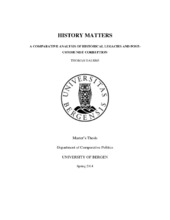History matters. A comparative analysis of historical legacies and post-communist corruption
Master thesis
Permanent lenke
https://hdl.handle.net/1956/8737Utgivelsesdato
2014-06-02Metadata
Vis full innførselSamlinger
Sammendrag
This thesis investigates the empirical relationship between historical legacies and post-communist corruption. A common argument in the post-communist corruption literature is that the current problems of corruption should be traced to either the communist past or to the transition from the socialist economy. However, this thesis join the ranks of Møller and Skaaning (2010) who claims that deep structural causes are of the essence: causes that transcends both the transition from the socialist economy and the communist experience. In particular, the hypothesis that pre-communist bureaucratic legacies can explain much of the current variation in levels of post-communist corruption, receives support. In contrast to Møller and Skaaning (2010) I use time-series cross-section (TSCS) data (they apply cross-sectional data) and test the hypothesis against a larger battery of alternative explanations. The main conclusion of this study is that levels of post-communist corruption largely can be explained by historical legacies. Furthermore, this study finds evidence for the impact of imperial legacies (which is a closely related variable to bureaucratic legacies) and it finds partial support for the effect of a protestant heritage. In addition, it shows that post-communist countries on average are more corrupt than other countries, but argue that this difference also reflect pre-communist causes that got reproduced during communism.
